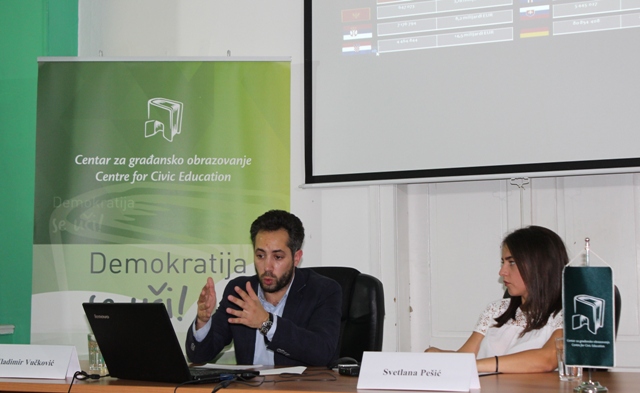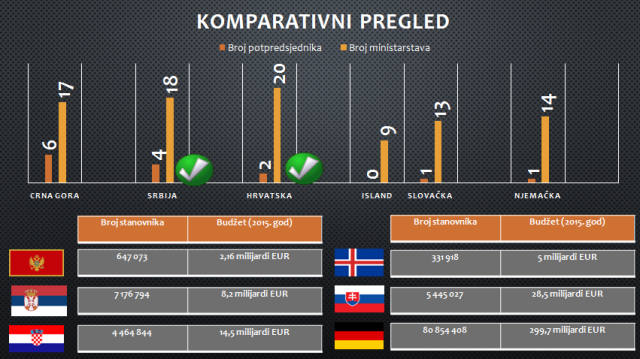Centre for Civic Education (CCE) has today presented analysis What type of Government organization do we need?, which is a part of regular activities of CCE within the subprogramme Accountability and Transparency of Authorities.
Svetlana Pešić, CCE programme associate, has pointed out that „organization, functionality and transparency of the executive branch is dominantly affecting the quality of political decisions, and consequently the quality of life of all citizens expressed through good housekeeping attitude of authorities towards resources and public interest“.
„What type of Government does Montenegro need? What is the role of inner cabinets, what are their advantages and disadvantages? How much does it cost us having members of Governments and advisers of the inner cabinet? How can we reach an effective organization of the government that is resposible to citizens? were some of initial questions that have motivated Centre for Civic Education’s (CCE) team to reflect on existing system of the Government’s organization in Montenegro, by using a comparative analysis of certain countries in our vicinity, as well as EU member states, but also of those who are neither, but, due to other reasons, they can serve as role model to Montenegro. We have compared the example of Montenegro to Serbia, Croatia, Slovakia, Germany and Iceland. Also, CCE will give recommendation of new organization of Government of Montenegro that can be useful also to actors that will in October 2016 participate in parliamentary elections”, added Pešić.
Vladimir Vučković, CCE programme associate and author of the analysis, while presenting key findings, emphasized that official data on Government members and advisors of the inner cabinet of Government of Montenegro are among the most transparent in comparison to countries analyzed, but also that Government of Montenegro must further strenghten its transparency in availability of information that can provide clear insight in decisions that it makes, as well as in manner of expenditure and management of state resources.
„Montenegrin Government is numerous and cumbersome, which does not correspond to the wish for efficient and saving approach, hence it is recommendation that the next government should be far scarcer, more compact and more effective“, adds Vučković. Comparing to the analyzed countries, Vučković has pointed out that Montenegro is a record holder in number of vice presidents (6) and their advisors (30), and it is in the very top when it comes to number of ministries (17), regardless of the fact that it has the smallest budget (EUR 2.16 billion): „Hence Iceland, which is demographically close to Montenegro, with a budget of 5 billion euros has no vice presidents and has only 9 ministries, while Germany with the budget of 299.7 billion euros has one vice president and 14 ministries“, emphasized Vučković.
He assessed that „Government of Montenegro must not be a place for „adoption“ of coalition partners or „balancing“ of party cadres, but a modern, efficient and a citizes’ service based on verifiable results“, and that „it is necessary to significantly change the organizational structure of minstries within the Government of Montenegro and reduce the current number from 17 to optimal 10 ministries. Specifically, in accordance to current internal and foreign policy priorities, it is a recommendation that Government of Montenegro should have following ministries: Ministry of Finance and Economic Affairs, Ministry of Interior, Ministry of Foreign Affairs and European Integration, Ministry of Defence, Ministry of Health, Ministry of Education, Science and Sports, Ministry of Culture and Media, Ministry of Sustainable Development, Agriculture and Tourism, Ministry of Labor and Social Welfare“.
All public officers, even the Government officials and their advisors, are being paid from the budget, i.e. with the money of citizens of Montenegro. Unnecessary production of great number of ministries and engagement of armies of advisors in the inner cabinet is sending a message that party interests are coming before the public ones in the Government. Montenegrin Prime Minister and six vice presidents of Government are being currently advised by near 30 advisors, and it is a rough estimate that monthly price of work of Prime Minister, members of Government (vise presidents and ministers) and advisors of the inner cabinet is around EUR 75, 750 expressed in net amount (i.e. around EUR 124, 000 in gross amount)“, summed up Vučković.
„Having in mind the Montenegrin context, it is necessary to adopt as soon as possible the Law on Government of Montenegro, which will in the normative manner encompass legal and political system, which includes arranging an adequate structure of inner cabinet, whose number of vice presidents, in addition to the president of Government, should not exceed two, in relation to current record of six. The Law on Government of Montegero must define also status of first vice president of Government in the case that executive branch has more than one vice presidents, exercising jurisdiction of replacing the president of Government in case of absence or unavailability within authority that is transferred to him/her. Furthermore, Law on Government of Montenegro should define a special obligation for one of vice presidents of Government to attend sessions of the Parliament of Montenegro, considering the constitutional obligation of executive branch to exercise laws and other regulations adopted by the Parliament of Montenegro. Finally, Law on Government should more concretely regulate composition of ministers who are implementing programme and policy of Government“, emphasized the author.
„Political parties should, within their election programmes, clearly recommend a manner and structure of organization of Government, which would be applied after elections, if they were able to affect its formation. Thus, citizens would have a full information, from all political subjects, which could also measure where the compromise between systemic solutions and feeding a party appetite is being made, as well as who are actors of these deals which are reflection of management of resources that is not conducted in a good housekeeping manner“, concluded Vučković.
Svetlana Pešić, programme associate


